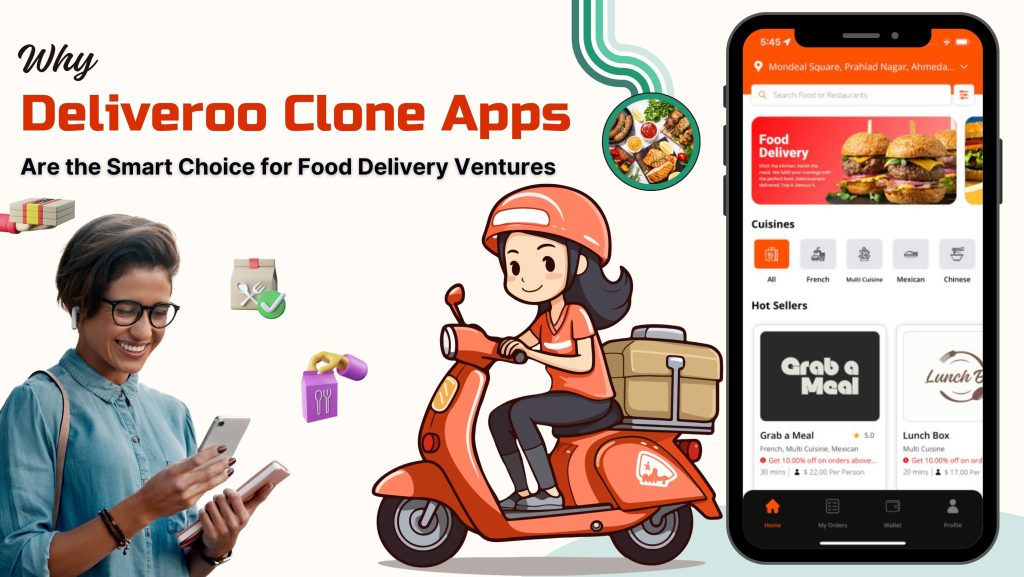
Many entrepreneurs are choosing a Deliveroo Clone App in 2025. It’s not just a template; it’s a system that works. You get the core features, menus, checkout, and tracking, already built. Also, Brand it your way. You can tweak the workflow, test promos, and go live fast. No months of coding, no endless iterations just to figure out if your app even makes sense. And here’s the kicker: these clone apps don’t just save time. They give you a platform that’s proven in real world conditions, ready to scale, and ready to handle the messy, unpredictable world of food delivery.
So why are entrepreneurs betting on Deliveroo style platforms this year? Let’s dig in, there are seven reasons that make the Deliveroo Clone App an obvious choice if you want to get serious about food delivery.
1. Lightning Fast Launch
Imagine this: you have a great idea for a delivery start up. You start from scratch. Six months later, you’re still debugging checkout issues while competitors are already grabbing customers. Frustrating, right?
A Deliveroo Clone App changes that. The app comes pre built. You tweak the branding, integrate local payment gateways, and suddenly, you’re live. Weeks, not months. This first mover advantage is huge, even in saturated cities.
2. Proven Business Model
It’s one thing to have an app. It’s another to have an app that actually makes money. Deliveroo has spent years refining its revenue model: commissions, delivery fees, promotions, and partner relationships.
A Deliveroo Clone App inherits that playbook. You don’t need to reinvent the wheel. Want to know a little secret? Most start ups fail not because the app is bad, but because the economics don’t work. The clone model gives you a solid foundation. You tweak for your local market, add promotions, and suddenly you’re in a sweet spot where both restaurants and customers feel it’s fair.
Plus, having a tested model helps with investor conversations. “Yes, our app is new, but it’s built on a system that has proven revenue mechanics,” you can say. That’s credibility that’s hard to manufacture from scratch.
3. Advanced Features Out of the Box
Let’s be honest: building advanced app features takes time, money, and expertise. Real time tracking, route optimization, multiple payment methods, push notifications, these aren’t trivial.
A Deliveroo Clone App gives them to you immediately. Customers can see their food’s journey, which builds trust. Drivers get optimized routes, which increases efficiency.
4. Scalability That Actually Works
Many apps start small, then crash under growth. Deliveroo learned that scaling isn’t just about servers. It’s about architecture, operational flexibility, and data pipelines.
A Deliveroo Clone App is built with scalability in mind. Add more restaurants. Cover new neighbourhoods. Introduce grocery deliveries or convenience items. You can expand vertically and horizontally without rewriting the entire app.
This is critical. When you start seeing traction, you don’t want to hit a wall. Clone apps let start ups grow fast, confidently, without the risk of collapsing under success.
5. Cost Efficiency
Let’s talk money. Start ups rarely have deep pockets. Developing an app from scratch costs tens of thousands, often more. Then there’s maintenance, updates, and bug fixes.
The Deliveroo Clone App drastically reduces upfront costs. Most core functionality is already done. Maintenance becomes manageable. You can redirect savings to marketing campaigns, delivery incentives, or local partnerships, things that directly increase revenue.
Think about it: your first month post launch should be about learning and adapting, not fire fighting tech problems. Clone apps give you that breathing room.
6. Customization and Branding
Some people assume a clone app is cookie cutter. Not true. Modern Deliveroo Clone Apps allow full branding: logos, colours, fonts, home screens, categories, promo logic, messaging tone.
You can make it feel entirely yours. It’s like buying a house that’s pre built but letting you decorate every room. Customers see a polished, unique app. You get the benefit of a proven system under the hood.
The ability to tweak UX, notifications, and loyalty programs means you can stand out in your local market, even if competitors are running similar platforms.
7. Built in Analytics and Insights
One of the biggest advantages? Data. A clone app usually comes with dashboards and metrics. Real time order volumes, delivery times, customer retention, and popular restaurants, all at your fingertips.
This transforms decision making. You can adjust delivery zones, tweak promos, optimize schedules, and even predict peak demand before it hits. Instead of guessing, you’re acting on solid insights.
Some start ups underestimate this. Yet, data driven decisions often separate profitable operations from those constantly chasing problems.
Extra Advantages
Beyond the seven main reasons, there are smaller, but valuable benefits:
- Driver management tools: automated incentives, transparent earnings.
- Regulatory support: some clone providers help navigate local delivery laws.
- Loyalty program integration: built in, easy to customize.
- Marketing hooks: from push notifications to social media integrations.
These make the Deliveroo Clone App a complete solution, not just software.
Conclusion
Launching a food delivery business in 2025 is messy. The market moves fast. Consumers expect speed and reliability. Margins are thin. That’s why so many entrepreneurs turn to a Deliveroo Clone App.
Choosing a Deliveroo Clone App in 2025 is about leveraging proven mechanics, embracing modern tech, and giving yourself a head start. For any start up wanting to enter the food delivery space, it’s less risk, more speed, and ultimately, a better chance to build a sustainable, profitable business.